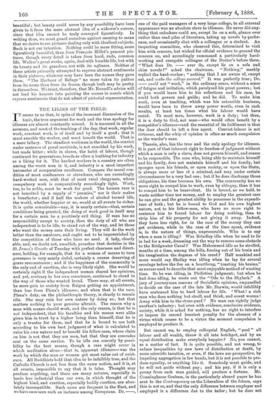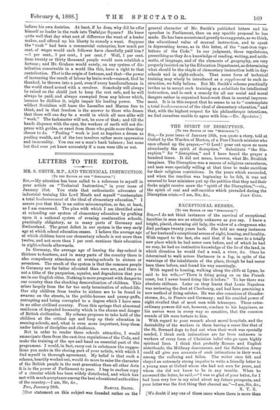THE LILIES OF THE FIELD.
IT seems to us that, in spite of the incessant discussion of the topic, the true argument for work and the true apology for idleness are almost constantly missed. It is assumed in all the sermons, and most of the teaching of the day, that work, regular work, constant work, is of itself and by itself a good ; that it must ennoble the worker, and must benefit the world. That is a mere fallacy. The steadiest workman in the world, the convict under sentence of penal servitude, is not ennobled by his work, but made bitter ; while in slaves, the habit of labour, though continued for generations, breeds as often a loathing for industry as a liking for it. The hardest workers in a country are often among the worst men in it, and industry is a most imperfect barometer of comparative excellence. Compare the moral con- dition of most coalheavers or stevedores, who are exceedingly hard-worked men, with that of most rural clergymen, whose compulsory work is comparatively exceedingly light. Work, too, to be noble, must be work for good. The human race is not benefited by a supply of 'jemmies," nor is their maker a benefactor ; and if half the makers of alcohol turned idle, the world, whether happier or no, would at all events be richer. It is quite conceivable—nay, it is nearly certain—that, certain conditions being granted, the doing of work good in itself may for a certain man be a positively evil thing. If man has no responsibility except to society, then the duty of all who are independent is to be idle, to stand out of the way, and let those who want the money earn their living. They will do the work better than the amateurs, and ought not to be impoverished by the competition of those who have no need. A lady, clearly able, and, we doubt not, unselfish, preaches that doctrine in the St. James's Gazette of Tuesday with perfect clearness and direct- ness, holding, for example, that for a woman of means to turn governess is very nearly sinful, certainly a course deserving of grave remonstrance; and if the happiness of the community is the only end of exertion, she is very likely right. She would be certainly right if the independent woman shared her opinions, and yet, contrary to her own conscience, continued to stand in the way of those who wanted bread. There may, at all events, be more gain to society from Exigna getting an appointment, than loss from Plena's idleness ; and when that is the case, Plena's duty, on the philanthropic theory, is clearly to remain idle. She may ruin her own nature by doing so ; but that matters nothing to your genuine altruist. The reason why a man with means should work, and the only reason, is that he is not independent, tbat his faculties and his means were alike given him in trust by a higher being than himself, that he is only a trustee for them, and that he is bound to use both according to his own best judgment of what is calculated to raise his own nature and to benefit his fellow-men, whose claim on him is not that they are men, but that they are comrades sent on the same service. To be idle can scarcely by possi- bility be the best means, though a ease might occur in which meditation alone—that is, apparent idleness—was the work by which the man or woman got most value out of exist- ence. All Buddhists hold that idea to be infallibly true, and the Catholic Church is not free from the same notion, and it is, at all events, impossible to say that it is false. Thought may produce anything, and there are many natures, especially in lands less industrial than our own, in which thought of the highest kind, and exertion, especially bodily exertion, are abso- lutely incompatible. Such cases are frequent in the East, and we have once seen such an instance among Europeans. Dr. —, one of the paid managers of a very large college, to all external appearance was an absolute slave to idleness. He never did any-
thing that onlookers could see, except lie on a sofa, glance over rather than read piles of literature, taking up novels by prefer- ence, and occasionally chat with a colleague or a student. An inspecting committee, who observed this, determined to visit him with censure, but wished for official evidence to ground the censure on, and accordingly summoned a particularly hard- working and energetic colleague of the Doctor's before them. "What does Dr. — ever do, except lie on a sofa and skim novels ?" asked the chairman. "Nothing," meekly replied the hard-worker ; "nothing that I am aware of, except eat, and make the college succeed." It was perfectly true ; Dr.
could not "work," in the ordinary sense, without a sense of fatigue and irritation, which paralysed his great powers ; but if you would leave him to his reflections and his ease, he could both govern and guide; and he did. To make him work, even at teaching, which was his ostensible business, would have been to throw away power worth, even in cash results, at least ten times what his labour would have saved. To most men, however, work is a duty; but then, it is a duty to God, not man—who would often benefit by a competitor's idleness—and the essential of its fulfilment is that the doer should be left a free agent. Convict-labour is not virtuous, and the whip of opinion is often as much compulsion as the warder's cane.
Therein, also, lies the true and the only apology for idleness. It is part of that inherent right to freedom of judgment without which a man is only a slave, does not govern himself, and ceases to be responsible. The man who, being able to maintain himself and his family, does not maintain himself and his family, but sponges upon his friends, or upon society, or upon the State, is always more or less of a criminal, and may under certain circumstances be a very bad one; but if he does discharge those obligations, his time becomes his own. The community has no more right to compel him to work, even by obloquy, than it has to compel him to be benevolent. He is bound, as we hold, to waste neither time nor money, and to employ the greatest care he can give and the greatest ability he possesses in the expendi- ture of both ; but he is bound to God and his own highest nature, not to his fellow-men, who have no more right to sentence him to forced labour for doing nothing, than to strip him of his property for not giving it away. Indeed, they have less right, for in the case of the money they can get evidence, while in the case of the time spent, evidence is, in the nature of things, unprocurable. Who is to say when a man is idling ? Was Brindley idle when he used to lie in bed for a week, dreaming out the way to remove some obstacle to the Bridgwater Canal ? Was Mahommed idle as he strolled, months at a time, among the bills, forcing out of his brain and his imagination the dogmas of his creed ? Half mankind and more would say Shelley was idling when he lay for several evenings before the fire on a hearthrug, "toasting his brains," as nurses used to describe that most enjoyable method of wasting time. So he was idling, in Philistine judgment ; but when he had done idling, he wrote out the "Ode to the Skylark." A jury of journeyman masons of Socialistic opinions, empanelled to decide on the case of the late Mr. Darwin, would infallibly have sentenced him to bard labour for life. ' What ! a rich man who does nothing but stroll, and think, and count worms ! Away with him to the stone-yard!' No man can rightly judge another's industry; but.even with evidence, conclusive evidence, society, while it is asked for nothing, has no right to interfere or impose its second heaviest penalty for the absence of a virtue which ceases to be a virtue the moment compulsion is employed to produce it.
But cannot we, to employ colloquial English, " pool " all labour and all wealth, throw it all into hotchpot, and by an equal distribution make everybody happier P No, you cannot, as a matter of fact. It is quite possible, and not wrong, to reduce inequalities by new laws of distribution at death, by more scientific taxation, or even, if the laws are prospective, by impeding aggregation in few hands, but it is not possible to pro- duce equality, or anything like it. Somebody must guide, and he will not guide without pay ; and his pay, if it is only a penny from each man guided, will produce a fortune. Mr. Cunninghame Graham, in the particularly absurd paper he has sent to the Contemporary on the Liberalism of the future, says this is not so, and that the only difference between employer and employed is a difference due to the tailor ; but he does not
believe his own doctrine. At least, if he does, why did he offer himself as leader in the rush into Trafalgar Square ? He knew quite well that day what sort of difference the want of a leader makes, and offered up his liberty to remedy a want. Suppose -the " rush " had been a commercial enterprise, how much per cent. of wages would each follower have cheerfully paid him ? —5 per cent., 3 per cent., 1 per cent. ? Well, 1 per cent. from twenty or thirty thousand people would soon establish a fortune ; and Mr. Graham would surely, on any system of dis- tribution conceivable in a world like this, have a right to that ontribution. That is the origin of fortunes, and that—the power of increasing the result of labour by brain-work—cannot, God be thanked, be thrown into a pool, even if every handicraftsman in the world stand armed with a revolver. Somebody will always be raised on the shield just to keep the rest safe, and he will always be paid, and always exempted from any labour which, because he dislikes it might impair his leading power. The wildest Socialism will leave the Lassalles and Marxes free to -think, and in that freedom is the answer to those who dream that there will one day be a world in which all men alike will " work." The taskmaster will not, be sure of that ; and till the hands dispense with the eyes, the workers of earth will not dis- pense with guides, or exact from those who guide more than they choose to do. "Pooling" work is just as hopeless a dream as pooling wealth, and of the two involves rather more oppression and immorality. You can see a man's bank balance ; but none but God ever yet knew accurately if a man were idle or not.



































 Previous page
Previous page